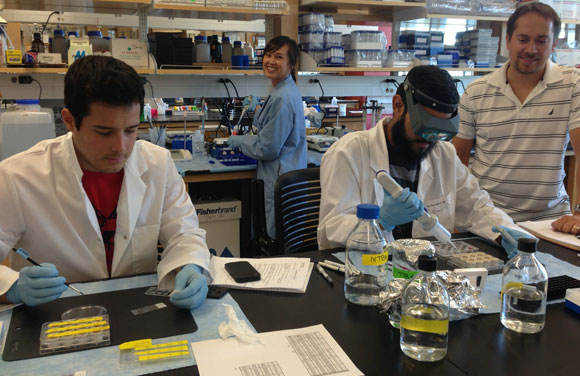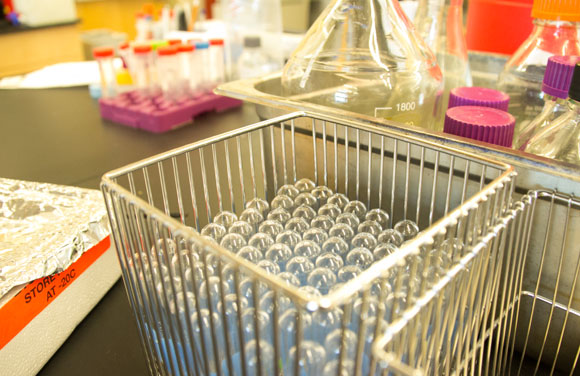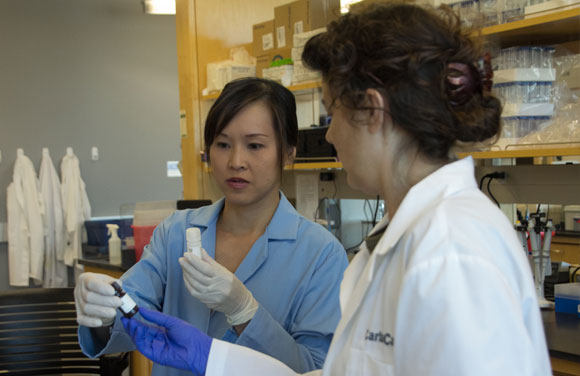Graduate Student Handbook The doctoral training program in Molecular Medicine is designed to prepare PhD-level students for a career in research and research-related fields. As such, training activities include experimental research, coursework, and participation in journal clubs and seminars.
Trainees entering the Molecular Medicine program will conduct original research in one of the laboratories our training faculty, as well as complete coursework in one of three emphases: Cell Biology, Immunobiology, or Medical Biophysics. Participation in journal clubs and seminars will provide broad, cross-disciplinary exposure to cutting-edge questions and themes related to Molecular Medicine. In total, the curriculum is designed to train the next generation of forward-thinking and innovative scientists.
The Graduate Program in Molecular Medicine (GPMM) requires a base 36 credits of coursework (18 or more graded units, plus 9-10 units for the minor, 5 of which are graded) for the Doctorate of Philosophy degree, broken up as follows:
- A core curriculum consisting of:
- CMM/MCB 577: Principles of Cell Biology (Fall, 4 units)
- CMM/MCB 695E: Science, Society, & Ethics (Spring, 2 units)*
- IMB 521 Scientific Writing (Spring, 2 units)
- IMB 575 Scientific Writing for Predoctoral Students (Fall, 1 unit)
- BIOS 576A Biostatistics in Public Health (Fall and Spring 3 units) OR MCB 516A Bioinformatics and Functional Genomic Analysis (Spring 3 units) OR MCB 547 Big Data in Molecular Biology and Medicine (Fall 3 units) OR MCB 585 Multidisciplinary Approaches to Solving Biological Problems (Fall 4 units)**
*Or an equivalent course approved by the GPMM Directors that satisfies RCR requirements for UA researchers funded by NSF or federal research grants
**Note: the requirement is for students to take one of these courses
- 6 or more credits of electives
- 6 or more total credits of Student Seminar
- 6 or more credits of Journal Club/Work in Progress Seminar/Colloquium coursework
- 12+ units of CMM/IMB 900 (Research) - 6 units per semester until successful completion of qualifying exams in second year
- 18+ credits of CMM/IMB 920 (Dissertation) - 6 per semester post-qualifying exams, until graduation
With the approval of the graduate mentor, students may take additional courses for credit.
When making course selections, select the appropriate Track using the red navigation buttons below to review specific requirements relating to that that course of study.
Below are useful trainee links:
T32 Funding Opportunities:
GPMM has several funding mechanisms available for students, including opportunities for predoctoral trainees to participate in unique, NIH-funded training experiences.
Infection and Inflammation as Drivers of Aging (IIDA) T32 Training Grant information
This NIH T32 grant focuses on under-investigated areas of research, training students in Infection and Inflammation as Drivers of Aging (IIDA). IIDA provides unique training for pre-doctoral students who are interested in leadership and research positions in sectors of academia, industry and government with a focus on the biology of aging.
Interdisciplinary Training in Cardiovascular Research T32 Training Grant Information
The goal of the Interdisciplinary Training in Cardiovascular Research program is to train the next generation of scientists to actively and independently pursue heart, vascular and lung research in academic, industrial and government settings. Trainees of the CVR Program develop a breadth and depth of training that integrates a mechanistic understanding with tools to better translate molecular, cellular, and physiological insights of the cardiovascular system to human health and disease.




